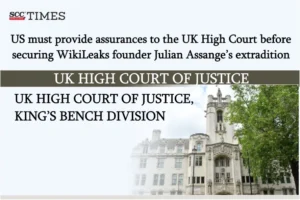UK High Court of Justice, King’s Bench Division: The Divisional Bench comprising of President Dm. Victoria Sharp, J.* and Johnson, J. heard the appeal of WikiLeaks founder Julian Assange, against the extradition order of Secretary of State. The United States has been seeking the extradition of Assange to try him in the US for 18 offences under US Espionage Act. The Court has directed the US Government to provide certain assurances that Assange is permitted to rely on the First Amendment and is not prejudiced at trial by reason of his nationality, that he is afforded the same First Amendment protections as a United States citizen, and that a death penalty is not imposed.
The Court further directed that these assurances from the US Government are to be given latest by 16-04-2024, and in the event of no assurance, the Court will be grant the leave to appeal to Assange.
Background
Julian Assange Australian journalist, editor, and founder of WikiLeaks has been subjected to multiple attempts by the American government to be tried in America for the charges under the Espionage Act, for publishing secret data of the US, creating national security issues, and subjecting various people to threats. Assange faces 18 counts of charges under the American legislation. The Secretary of State decided that Assange be extradited to the US, against which the instant appeal was brought before the High Court of Justice.
Prior to this appeal, the applicant had secured a favourable decision in 2020, where under the Court concluded that the extradition of the applicant would be oppressive, particularly having regard to the possibility that he might be subject to “special administrative measures” by the US Government. In response, the respondent appealed, and assured that the applicant would not be subject to special administrative measures, and if convicted, the respondent would give consent for the applicant to serve sentence in Australia. The Divisional Court, in 2021 allowed the respondent’s appeal in the light of those assurances.
Analysis and Findings of the Court:
Clarifying on the active British legislation on extradition, the Court said that extradition is regulated by the Extradition Act 2003. It was pointed out that if a bar to extradition prescribed by the 2003 Act applies, then extradition must be refused. If none of the bars set out in the 2003 Act apply, then extradition must be ordered. Neither the court, nor the Secretary of State, has any discretion. The court does not have a general discretion to decide whether the applicant should or should not be extradited. The approach to be taken by an appeal court is also closely regulated by the 2003 Act. The appeal court is required to review the decisions of the judge and the Secretary of State and decide if those decisions have been shown to be wrong.
Responding to the applicant’s argument of prohibition on extradition for political offenders under the US-UK Extradition Treaty and international law, the Court emphasised that it must apply the law passed by the British Parliament. Earlier, UK legislation in 1870 prohibited extradition for political offences, but that legislation has been repealed and the 2003 Act does not prohibit extradition for a political offence. However, the 2003 Act says nothing about preventing extradition for a political offence. Although there may be a degree of overlap, the two are separate concepts. Parliament has legislated to cover the former, not the latter.
Furthermore, the Parliament had chosen not to incorporate the US-UK Extradition Treaty into UK law and not to prohibit extradition for a political offence.
Further clarifying on the application of the European Convention on Human Rights (“Convention”), the Court said that seeking extradition for political offence is not a breach of the Convention.
Lastly, the Court considering that whether the applicant could be charged with offences punishable by death, the Court said that the order of extradition by the Secretary was wrong and should have directed the provision of protection against speciality/death penalty.
Concluding, the King’s Divisional Bench held that in the absence of required assurances by the respondent, the applicant will be granted the leave to appeal without further hearing. In case the assurances are given, then the Court will give the parties an opportunity to make further submissions before we make a final decision on the application for leave to appeal.
[Julian Paul Assange v. Government of the United States of America [2024] EWHC 700 (Admin), decided on 26-03-2024]
Judgment by: Dame Victoria Sharp, J., President of the Bench-
Advocates who appeared in this case :
Applicant- Edward Fitzgerald KC, Mark Summers KC and Florence Iveson (instructed by Birnberg Peirce)
Respondent- Clair Dobbin KC and Joel Smith (instructed by Crown Prosecution Service) for the First Respondent Ben Watson KC (instructed by the Government Legal Department) for the Second Respondent

